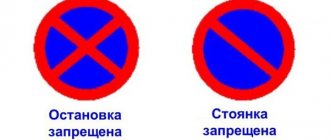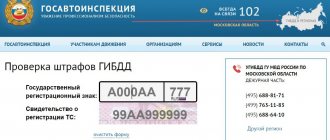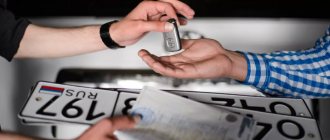What is it, what articles of the Civil Code of the Russian Federation is it regulated?
Reference. Ownership of a vehicle is a real right that gives its owner the opportunity to freely dispose of the vehicle, including transferring it to third parties under an agreement.
In the Russian Federation there are the following forms of ownership:
- state federal;
- state regional;
- public organizations;
- private.
Based on numerical characteristics, individual, public and group property is distinguished.
Legislative regulation of ownership of a vehicle and its transfer is based on Art. 218, 223, 224 and 235 of the Civil Code of the Russian Federation.
Owner and owner of transport - what is the difference?
The owner of the vehicle is the person whose data is reflected in the title. The owner is considered to be a person who legally controls the vehicle, for example, by power of attorney or by lease. It is the owner who is responsible for damage caused in the event of an accident.
At what age can you become the owner of a car? Can you have a minor child?
Civil legislation does not provide for age restrictions regarding vehicle owners.
In accordance with the administrative regulations “On the procedure for registering motor vehicles,” if a car is registered in the name of a person under the age of 14, a guardian or parent must act as an official representative. The interests of the child can be represented by another person who has confirmed his status in writing.
Persons over 14 years of age can apply for a vehicle themselves if they have written permission from their parents or guardians. It is important to remember that minors are prohibited from driving.
How to find out the last name of the owner of a car by his state license. number
The only official way to find the owner by car number is to check the traffic police database, but State Traffic Inspectorate employees have access to this database directly.
Since traffic police officers do not have the right to disclose the surname or other personal data of the car owner to third parties in accordance with Federal Law N 152-FZ “On Personal Data,” the answer to the question of whether it is possible to find out the owner of a car by state registration. car number depends on whether you have good reasons for this.
Operators and other persons who have access to personal data are obliged not to disclose to third parties or distribute personal data without the consent of the subject of personal data, unless otherwise provided by federal law.
Article 7, Federal Law No. 152
By law, you have the right to access the personal information of the car owner if both of you are involved in a case of an administrative offense (for example, if an accident occurs). In the case when you act as an accused in a case, you can familiarize yourself with all the materials of the case, including the required personal information, in accordance with Part 1 of Art. 25.1 Code of Administrative Offenses of the Russian Federation:
A person against whom proceedings are being conducted for an administrative offense has the right to familiarize himself with all the materials of the case, give explanations, present evidence, file petitions and challenges, use the legal assistance of a defense attorney, as well as other procedural rights in accordance with this Code.
Part 1 art. 25.1 Code of Administrative Offenses of the Russian Federation
The victim has the same rights under Part 1 of Art. 25.2 Code of Administrative Offenses of the Russian Federation:
The victim has the right to familiarize himself with all the materials of the case of an administrative offense, give explanations, present evidence, file petitions and challenges, use legal assistance from a representative, appeal the decision in this case, and use other procedural rights in accordance with this Code.
Part 1 art. 25.2 Code of Administrative Offenses of the Russian Federation
Thus, in order to find out personal information about the car owner by car number in the event of an accident, you can contact a traffic police officer, referring to Article 25.1 or 25.2 of the Code of Administrative Offenses of the Russian Federation.
This is interesting: How to enable AUX on a pioneer radio
When this moment of transition occurs, what does it mean?
Transfer of ownership of a vehicle is the transfer of rights and obligations associated with the vehicle to another person. According to Art. 223 of the Civil Code of the Russian Federation, this right begins from the moment when the property passes into the ownership of another person, unless otherwise provided by law or agreement. As stated in Part 2 of Art. 218 of the Civil Code of the Russian Federation, the basis for the transfer of ownership of a thing is a purchase and sale agreement.
What confirms the occurrence of this moment?
Important! The main title document for a car is the vehicle passport (PTS). If the car is new, you can get it from the manufacturer, supplier or customs authorities.
To confirm the transfer of rights to a used car, a notarized sales contract is drawn up, and the title is provided by the seller.
In addition, the owner must have a compulsory motor liability insurance policy and a vehicle registration certificate in case of a traffic police inspection.
The car's license plates are entered into the database indicating the owner. Only after completing the registration procedure can you become a full owner.
In what cases should recognition be sought?
Recognition of ownership of a car is carried out by court order in the following cases:
- legacy transport section;
- loss of title documentation;
- division of property during divorce.
In addition, this procedure often accompanies transactions:
- purchase and sale;
- donations;
- exchange.
The need for it arises in the absence of important parts of the legal process.
A claim for recognition of property rights will be accepted only if the need to resolve the issue with the participation of judicial authorities becomes obvious.
How to transfer a car to a new owner?
The procedure is carried out at MREO and consists of several stages:
- Collection of documents specified in clause 15 of Order No. 605 of the Ministry of Internal Affairs of Russia.
- Visit to the registration office of the traffic police with a package of papers and an application for registration.
- Passing a vehicle inspection.
- Payment of state duty.
- Receiving new documents.
Reference! According to the regulations of the Ministry of Internal Affairs, which came into force in 2013, in order to re-register a car to another owner, it is not necessary to deregister the vehicle.
Frequently asked questions and answers
What to write in the State Services form when registering a vehicle?
Attention! It is not necessary to make an appointment when registering a new car. If the vehicle has changed ownership, the agreement confirming the transfer of title to the new person will tell you what to write in the “form of ownership” column.
The right to a purchased car can be confirmed by:
- deed of gift;
- contracts of exchange and purchase and sale;
- a document confirming the issuance of transport to a disabled person by the social protection authority;
- extract from the transfer deed when combining legal entities;
- court statement;
- certificate of inheritance and other similar papers.
To register a vehicle to a legal entity on the basis of economic management, you need to obtain an administrative document from a subject of the federation or a municipal structure assigning the car to the enterprise.
Usually, unless otherwise indicated in the document on the transfer of rights, “private” is written in the above column.
Is it possible to register a car for two owners and how to do it?
The purchase and sale agreement is drawn up for two buyers at the same time. One name is entered in the PTS. The car is used by agreement. If the second owner has problems with the ability to use the vehicle, the issue is resolved through the court.
What should be checked before purchasing a car from an organization?
Before signing the purchase and sale agreement, you must:
- make sure that there is a document confirming the authority of the person participating in the transaction;
- check whether the owners of the organization agree to the alienation of this property;
- make sure that the institution does not have arbitration litigation;
- check the technical condition of the machine.
If the car is not pledged, there are no restrictions on registration and there are no debts to bailiffs, the vehicle can be purchased.
Legal powers and responsibilities
According to legislative act No. 283-FZ dated 08/03/2018 (as amended on 07/30/2019), the owner of the vehicle has the right to:
- Carrying out state registration of a car. In this case, the choice of the traffic police department for entering data into the database can be made regardless of the applicant’s place of registration.
- Preservation of the number assigned to the vehicle, as well as its transfer upon sale or donation. The new owner can accept the car with the existing number or replace it.
- Obtaining registration marks that correspond to the state standard on the basis of clause 5. No. 256-FZ of July 30, 2019.
Along with rights come obligations:
- Within 10 days from the date of receipt of a vehicle that was not previously registered, you must go through the registration procedure. The same period is given for filing an application for a change of owner and making appropriate changes to the registration data.
- Independently visit the organization that produces registration plates to obtain them.
- Contact the registration department to perform other actions provided for in Art. 10 No. 283-FZ, for example, to restore a lost or deteriorated vehicle title.
- If necessary, provide the registration department with a vehicle for inspection.
- Pay transport tax on time.
Civil liability of the vehicle owner, also in case of an accident
The owner of a car who causes harm to others bears civil liability for this.
Damage must be compensated without fail, except for the following cases:
- the impact of a natural disaster or other force beyond control;
- damage caused by an unknown person;
- the cause of the damage was the malicious intent of the victim.
According to Art. 1079 of the Civil Code of the Russian Federation, a car is a source of increased danger, therefore the owner of the vehicle must compensate for the damage, even if it is proven that he was not involved in this situation.
For example, if a driver, in order to avoid hitting a pedestrian, is involved in an accident in which passengers are injured, he must first pay compensation to the victims and only then try to press charges against the pedestrian.
According to the Civil Code of the Russian Federation, mandatory compensation is subject to:
- moral injury;
- damage caused to property;
- harm to health.
Important. As stated in Art. 1083 of the Civil Code of the Russian Federation, if the victim committed negligence, due to which the harm caused to him increased, the amount of compensation payment will be reduced. In addition, the justice authorities must take into account the financial situation of the perpetrator.
What powers can be transferred to a third party by power of attorney?
The owner of the vehicle can transfer the following rights to the vehicle to third parties:
- order of the vehicle;
- passing a technical inspection;
- receiving a vehicle from the impound lot;
- registration of an insurance policy;
- registration of vehicles with the traffic police;
- obtaining a duplicate license plate number.
If third parties plan to complete a purchase and sale transaction, appear in court or travel abroad, the power of attorney should be certified by a notary. In other cases, it is enough to present a handwritten form of the document.
The right to drive a car in accordance with clause 2.1.1 of the Traffic Regulations is transferred without drawing up a power of attorney. Upon request, the driver will be required to present a package of documents for the vehicle and valid insurance.
Cost of owning a vehicle
When purchasing a car, many people do not think about the costs of its operation. The total amount depends on the make, model of the vehicle and region, and is calculated based on the following indicators:
- Loss of value after 3 years of use.
- Interest if the car was borrowed.
- Taxes and fees, including those necessary for registering a vehicle with the traffic police.
- Fuel.
- Insurance.
- Technical inspections.
- Other expenses: car wash, tire replacement.
Owner or proprietor: who is responsible for an accident?
Road accident without a license and compulsory motor liability insurance
Citroen and VAZ-2110 cars collided in the Moscow region. The driver of the “ten”, Sergei Kuragin, who was driving in reverse, turned out to be at fault. The car belonged to his wife, Elena Kuragina*. Her husband was not registered with OSAGO and did not have a driver’s license.
Oral car sale transaction: problems and consequences
The owners of Citroen, Agroproduct LLC, went to court. They demanded that the defendants, the owner of the car and her husband, jointly and severally recover more than 100,000 rubles. for repairs and legal expenses.
Two instances partially satisfied the claim. The Sergiev Posad City Court of the Moscow Region (case No. 2-4196/2018) and the Moscow Regional Court decided that only the driver of the car should pay the money - after all, it was he who was to blame for the accident. The applicant challenged these findings in the Supreme Court. Representatives of Agroproduct insisted that damages should also be recovered from the owner of the car responsible for the accident.
VS: handing over the keys does not mean abdicating responsibility
The Collegium for Civil Disputes, chaired by Judge Vyacheslav Gorshkov, recognized that the judicial acts of the lower courts were adopted in violation of the rules of law. In the ruling on the case (case No. 4-КГ20-11), the Supreme Court indicated that under Art. 201 of the Civil Code (Limitation period for cases of change of persons in an obligation), the owner bears the burden of maintaining his property. And according to clause 1 of Art. 1079 of the Civil Code (Liability for harm caused by activities that create an increased danger to others), those associated with dangerous activities must compensate for harm if the source of the danger caused the damage. Except in cases where force majeure or the intent of the victim is involved. The owner of the “dangerous” property – in this case, a car – compensates for the damage.
The Supreme Court emphasized: the fact that Kuragin received documents for the car and the keys to it does not equate him to the owner of the car - it only confirms that the owner wanted to transfer the property to him for use.
This also does not mean that the rights to own the car have been transferred, and does not relieve the owner from the obligation to compensate for damage if the accident occurred due to the driver’s fault.
Receive insurance compensation without problems: instructions from Pravo.ru
The Supreme Court points out that the list of grounds for owning a car from Art. 1079 Civil Code is not exhaustive. “But any of these grounds requires appropriate legal registration - concluding an agreement, issuing a power of attorney for the right to drive a vehicle, including a person authorized to drive a vehicle in the insurance policy, etc.,” recalled members of the Supreme Court panel.
If Kuragina really transferred ownership of the car to her husband, it was she who had to prove this, the board noted and admitted that the owner of the VAZ was unlawfully released from liability. The case was sent for a new consideration to the appeal - the Moscow Regional Court (at the time of writing the material was not considered).
Experts: “The owner can also pay for the accident”
Damage in such a situation, in addition to the culprit, can be compensated by the owner of the car, confirms lawyer Akim Lozhkovoy, Borodin and Partners Borodin and Partners Regional Rating. : “With this determination, the Supreme Court makes a very important conclusion, sending the case for a new trial - the lower court did not clarify the issue of transfer of ownership of the car.”
In general, which construction to choose - “damage is compensated by the culprit of the accident”, “damage is compensated by the owner of the vehicle” or “damage is compensated by both the culprit of the accident and the owner of the vehicle”, depends specifically on the establishment of individual circumstances, recalls Lozhkova. In particular, it matters how the owner of the car transfers it for use and management to another person:
— Has any contract or agreement been concluded regarding the use of transport and the risks of both vehicle loss and damage from an accident;
— Is the liability of the person to whom the vehicle is transferred insured?
— Is a power of attorney issued (its presence is not required, but a power of attorney can serve as evidence when distributing the burden of compensation for damage).
It is also important how the owner handed over the car - of his own free will or, for example, we are talking about theft.
*The names and surnames of the parties to the dispute have been changed
Restrictions
In some cases, the owner's rights to a vehicle may be limited. There are several types of encumbrances:
- Pledge. Used to ensure the borrower fulfills loan obligations. A citizen has the right to drive a vehicle, but transferring property to third parties is prohibited. After final settlement with the creditor, the owner can use the car again. If the money is not paid, the car is repossessed to pay off the debt.
- Arrest. Used to force the debtor to repay finances taken from the bank. In addition, this measure may be necessary to preserve the value of the property. The vehicle is withdrawn until the relationship between the lender and the borrower is resolved. An arrest can be made by the police, a court, or an organization executing a court order.
- Search. An encumbrance is imposed if the vehicle is included in the database of objects wanted by law enforcement agencies. In this case, it will not be possible to cross the border with it. Any interested person can find out that a car is wanted, so an attempt to sell such a car will most likely end up in a police station.
Important! Care should be taken to remove encumbrances before concluding a purchase and sale transaction. Otherwise, the vehicle will not be re-registered to the new owner.
Grounds for termination
According to Art. 235 of the Civil Code of the Russian Federation, ownership rights are terminated in the following cases:
- upon alienation of the vehicle to third parties;
- in case of voluntary renunciation of property rights;
- when the car is destroyed;
- upon confiscation.
The basis for alienation is a contract of sale or donation. The obligations of the owner of the car cease only when the rights to it are transferred to another person.
This means that if there was an encumbrance on the scrapped vehicle, compensation will still have to be paid.
Problems and difficult questions
- What are the features of the transfer of ownership from an individual to a legal entity? The previous owner of the vehicle can give the buyer who purchases the car for the purpose of subsequent sale the authority to terminate the registration of the vehicle with the traffic police. These powers are specified in the agreement or power of attorney.
- If a duplicate car is discovered, what should the owner of the original do? Most often, drivers find out about the existence of a double car when they start receiving fines.
In this case, you should write a statement to the traffic police, mentioning your non-involvement. It will be necessary to prove that the car was in a different place at the time of the offense. Comparing the original vehicle with CCTV footage can also help. In difficult situations, you will have to order an examination. - Who bears the tax burden when selling a vehicle? The owner whose details are indicated in the PTS.
- Will the new owner have problems registering a vehicle that was confiscated before purchase? Traffic police officers can track the entire history of the car. If there is no prohibition on registration, there are no grounds for refusal to the new owner. In any case, it is recommended to ensure that there are no encumbrances before purchasing.
- How to find information about the owner of the vehicle? Knowing the license plate number of the car, you can contact the traffic police and get an extract from the database about this vehicle. But you can count on providing such information only in the following cases:
- The vehicle is blocking the exit from the parking lot;
the driver of the car, as well as the person wishing to obtain information about him, was involved in an accident.
- How to change owner details? You must submit an application through State Services or during a personal visit to the traffic police department. After this, you need to drive your car to the State Traffic Inspectorate. You must take with you a printed application form, a receipt confirming payment of the state fee, and original documents. Once the review is completed, changes will be made to the papers.
In addition, on the official website of the traffic police you can check the vehicle by VIN code. There is no specific information about the owner in such an extract, but you can find out his status - an individual or legal entity.
Ownership of a vehicle is regulated by law, so law enforcement agencies can easily determine who should control and be responsible for the vehicle. Having understood this issue, the buyer can be confident in the purity of the transaction and the legality of his actions.
Check the owner of a car for free using the car's VIN code
Unfortunately, there is no answer to the question of how to find out the owner of a car for free by VIN code. State portals do not provide such a service; instead, using the VIN, you can register the car at:
- Number of owners (without personal data);
- Search;
- Participation in an accident;
- Availability of restrictions, etc.
Such a check can be carried out for free on the official website of the State Traffic Safety Inspectorate, as well as on the state portal Autocode (to check the car by VIN on Autocode, you will also need data from the STS).
Unofficial resources provide the service of checking a car by VIN code, and usually you need to pay a certain amount to get complete information. It is impossible to find the owner of a car by VIN code for free, but even for money there is no guarantee that you will receive reliable information about the person you are looking for.
This is interesting: How is mileage calculated on a car?








